
Five years ago I launched the second edition of my book The Content Advantage: The Science of Succeeding at Digital Business through Effective Content. In some ways that feels like yesterday. In other ways that feels like a lifetime ago!
First, some quick context. The Content Advantage is sometimes known as Clout 2.0 because the first edition, released in 2011, was called Clout. I decided the second edition merited a different name.
Content is science. In business, it’s also a game. While no book can give you a cheat code to guarantee you win with every content effort, this book acts as a guide you can turn to again and again as you play. Over time, you will win more than you lose and, consequently, make your content an advantage.
So, with this focus on turning content into an advantage, I wanted to share a few reflections on how the concepts have held up against the past five years’ profound changes.
1. Business Digitized Even Faster Than Expected
I mention early in The Content Advantage that digital disruption is accelerating. And I refer to it often as a big reason to invest in content. Here’s an example:
What percentage of Fortune 500 companies have disappeared since the year 2000?
If you guessed a number of 50% or more, you are correct. If you did not, you’re not alone. I was shocked to learn such a high percentage of U.S. publicly traded companies had died or become absorbed by competitors. How could this happen? Many business experts and journalists agree that the most significant cause is digital disruption. Digital no longer means offering a website or a mobile application to complement offline operations. It means fundamentally changing the way companies do business, such as facing new competitors and responding to the wide-ranging impact of artificial intelligence, just to survive, much less thrive.
Source: The Content Advantage
What I never anticipated was the way the pandemic and generative AI would take the pace of digital disruption into overdrive. (If you’ve experienced whiplash over the past few years, you’re not alone.) In many ways, this accelerated pace makes other key concepts in the book more relevant and useful than ever. Let’s turn to a few of those.
2. Content Vision Guides in Unexpected Situations
I introduced content vision to address problems the Content Science team and I encountered when advising an organization on strategy. As I explain in the book…
After spending a few days figuring out how to come up with content strategy to support a cloudy vision, I had chewed my pen cap until it was only a few shreds of plastic…Ever since, I have experimented with and studied content vision. In our most recent study, we found 73 percent of content teams who reported success had defined and gained buy-in to a content vision. My hope is to save you and your pen caps from the same stress.
Source: The Content Advantage
So, content vision is important in times when your circumstances are moving along as expected, and our research has identified content vision as a top success factor. What I’ve discovered since publishing the book is just how valuable content vision is when circumstances go sideways. Content vision can be a guide through both the expected and the unexpected.
One of my favorite examples is from Lymari Morales, who led communications at Johns Hopkins Bloomberg School of Public Health through the pandemic. She describes what it’s like to define and benefit from such a vision:
My team is extremely talented and capable, but the efforts weren’t necessarily laddering up to a vision. So I came in, listened and learned first, and then worked with my team to co-create a vision and put that vision on paper.
We did that in late 2019 to start piloting it in January 2020…and then when the pandemic came, we were already playing from the same playbook to apply those ideas to this information moment.
The vision that Lymari and her team established before COVID turned out to be a tremendous help, not a hindrance, when COVID reached pandemic levels. Without the vision, Lymari and her team would not have been able to respond as quickly and effectively as they did.
You can see more perspective from Lymari today as well as leaders with Mastercard, AT&T, March of Dimes, Chewy, ServiceNow, and more in our annual 2024 Content Predictions and Plans.
3. Content Operations Assessment Aids Resilience
The Content Science team and I developed the concept of content operations in response to problems we saw clients experience in implementing content strategy. The problems ranged from difficulty creating effective content in the right voice to trouble structuring and engineering the content to problems with process, standards, and governance. We started our ongoing study of content operations maturity in 2014. Based on that ongoing data, we developed and refined a content operations maturity model. Here’s my explanation:
Statistician George Box once said, “All models are wrong, but some are useful.” In that spirit, I developed this maturity model to help companies “get real” about their content operations. The model can help your company identify your current level of content operations and then decide whether that level will support your content vision and strategy. If it doesn’t, then the model can help you plan to get to the next level of content operations.
Source: The Content Advantage
Using the model to assess your level of content operations maturity was an important step when I wrote the book. Assessing content operations maturity is still an important step now. What’s different is how often your organization will have to assess. Let’s look at why.
Digital disruption can wreak havoc in the three main areas of content operations (people, process, and technology). Think pivots to offer new products, services, or features in a changed marketplace; layoffs or organizational restructuring due to the pivots; and changes to supporting tech stacks and tools, for a start. Each time a change like that happens, chances are you will need to assess your organization’s content operations–either as a whole or in specific areas. The good news? The content operations maturity model makes such an assessment easy to repeat.
It also has been exciting to help content operations gain visibility in a wide variety of areas, from user experience to marketing to customer success. Jeffrey MacIntyre, found of Bucket Studio and author of this seminal content strategy piece (also celebrating its anniversary this month), recalls an example in this anecdote:
One memorable occasion is the Content Ops Conference in Boulder some years back. I’d sought Colleen out to join me in presenting to a marketing technology software audience. I knew she’d bring no-nonsense research goods. Not only was she able to surface pertinent kernels from the book, but she was able to convey the tangible benefits of content ops, of taking a systems view of one’s content offering. No small feat!
The audience was by turns receptive or rapt. I was gratified to see things “land” in an event far away from UX circles, and closer to the functions making customer experience investments. It was an instructive experience for me to continue branching out into such settings for my own nano-practice, Bucket Studio, and engaging those ready to systematize their content and make it more expressive or performant.
Speaking of performant, let’s reflect on content intelligence.
4. Content Intelligence Is More Critical, Still Challenging
I introduce the concept of content intelligence in The Content Advantage like this:
Inspired by business intelligence, content intelligence is the term I use to refer to a system of collecting data related to your content and turning it into insight for content decisions and more.
Source: The Content Advantage
I viewed content intelligence as so important and beneficial that I gave it two chapters. And I’m glad I did. Over the past five years, our research continues to find strong correlations between content intelligence and success for all the reasons explained in the book. The correlation is so strong that we have made content intelligence one of the three key elements in an end-to-end content approach.
Yet, many organizations still struggle to implement content intelligence. For example, our research finds the percentage of organizations reporting that they do not regularly evaluate or measure content effectiveness still hovers at two thirds. And all the barriers to making content intelligence happen mentioned in The Content Advantage are still in play, such as lack of time, tools, and training.
This struggle to implement content intelligence continues to shock me as there is more data available in more useful tools now than ever before. (We even created one to accelerate getting the customer or user view of content effectiveness.) And there are plenty of success stories, such as our award-winning effort with The Home Depot. So I’ve concluded the difference-maker is leadership. The best and most successful content-curious leaders make evaluating content a priority despite challenges, and they progress through the levels shown below until their system of content intelligence is complete.
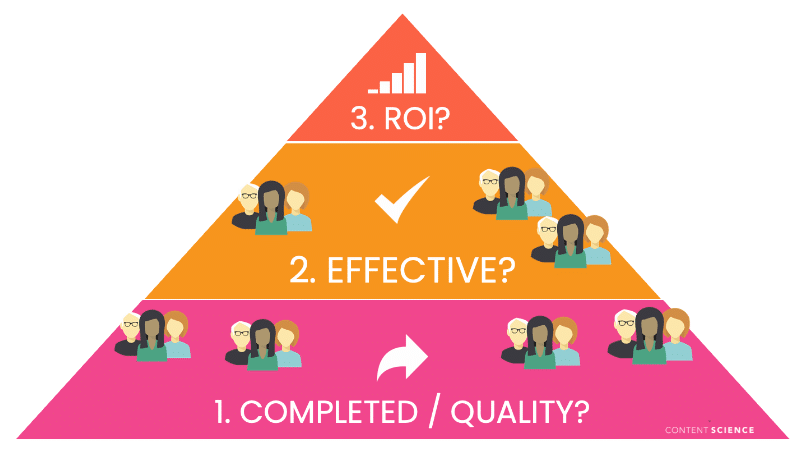
Now let’s shift gears to culture.
5. Culture Does Not Overcome Lack of Content Vision, Intelligence, + Ops
In the last chapter of The Content Advantage, I wonder aloud about the potential of culture to have a positive impact on content.
Positive culture forms a level of trust that reduces the need for documenting and implementing pedantic rules and excessive reviews. Culture also makes governance infinitely smoother. I find that companies that already have a strong progressive culture create the right content culture more easily.
Source: The Content Advantage
My thinking went something like this. If a quickly growing company or a large enterprise has gaps in other concepts discussed in The Content Advantage, a positive culture could help bridge those gaps. Since then, Content Science has worked closely with even more of the world’s fastest growing companies and the world’s largest enterprises, many of which tout their culture as unique or progressive. What I’ve found is
- For a fast-growing company and for enterprises, scaling culture is very hard. Even with the best of intentions, it breaks down or becomes corrupted without structure to support it.
- The presence of content vision, intelligence, and operations (including governance) makes a meaningful difference to culture, not the other way around. For example, if everyone knows what the vision is and whether they’re making progress toward it, there is less confusion, more motivation, and less risk for dysfunctional behavior.
- Culture alone does not fix the range of political and bureaucratic issues (land grabbing, silo syndrome, and fear of change, oh my!) that stymie content progress.
That’s why as Content Science expands our solutions to assembling large teams for clients, we strive to set those teams up for success. We help clients bridge gaps in areas that will affect the team, such as unclear processes or lack of data.
That’s also why I’m jumping-up-and-down eager to see more content-curious leaders in executive and C-suite positions. I don’t care whether your background is content, design, UX, marketing, product, engineering, or something else. You will be more successful if your leadership factors in content. I’ve shared a few hard-won insights on the characteristics of outstanding content leaders here.
Let’s Make Content Make a Bigger Difference
While I’m delighted that The Content Advantage still works after five years, that doesn’t matter much if others disagree and couldn’t use it. So, it’s been beyond rewarding to see so many readers of the book and participants in the workshop get true value from the concepts, frameworks, tips, and examples. These are a few of my favorite comments:
This Book Covers It All
I’ve held various roles in content strategy over the last decade and can confidently say this book covers it all. Very well written and easy to digest content. I’ve read similar books on content strategy and believe this one to be the best. I would recommend this book to anyone creating content, working on strategy, or creating the tools to deliver content.
Kyle McDougall, Intuit
Give Your Content Competitive “Umph”
This is one of those books you’ll want to share with your entire team. Learning the proven techniques and developing the shared language will give your content the umph it needs to increase your organization’s competitiveness.
Jared Spool, User Interface Engineering
Being Smart About Content Is a Necessity But Hard
The Content Advantage is a must read for current (and aspiring) content strategists, ux professionals, entrepreneurs, business owners, product managers, writers, and everyone else who touches digital content. Being smart about your content is a necessity for businesses today and hard to get right. I’ve referenced this book several times at work since I’ve purchased it (specifically on how to prep your content for the future, map content to business objectives, and assess its effectiveness) and couldn’t recommend more for anyone in this field.
Jacy Garaway, Vanguard
Advanced Thinking Combined with Practical Insight
The Content Advantage combines advanced thinking about data and content with real-life examples and practical suggestions. It can help any company of any size start today in making their content work to their benefit.
Lance Yoder, The University of Kansas Health System
My Most Recommended Text for the Content-Curious
I’ve had the fun and benefit of watching (or occasionally joining) Colleen educate audiences from Boulder to Manhattan and points beyond for two decades now. What’s become clear in that time is how The Content Advantage remains core to that impact.
Among our peers, she wasn’t first to market. To my mind, she’s been best to market for her enduring project on connecting content to business impact—and I have seen how that resonates up close in talks and workshops.
Her understanding of content performance is why the book has remained my most recommended text for those who are content-curious. The book and its spin-off efforts, like the annual effectiveness study, are required reading for anyone stewarding a digital place.
It continues to benefit a lot of us content subject matter experts. Nominally, we should be competitors, but her contributions are so varied, and her range so wide and assured, it’s been a repeat joy to recommend The Content Advantage (and its predecessor, Clout) over the years.
Jeffrey MacIntyre, Bucket Studio
And I’d love to hear how The Content Advantage has helped you as I ponder a third edition. (Exciting stuff!) Please either answer this brief survey or post a rating / review.
Events, Resources, + More
The Ultimate Guide to End-to-End Content
Discover why + how an end-to-end approach is critical in the age of AI with this comprehensive white paper.
The Content Advantage Book
The much-anticipated third edition of the highly rated book by Colleen Jones is available at book retailers worldwide. Learn more!
20 Signs of a Content Problem in a High-Stakes Initiative
Use this white paper to diagnose the problem so you can achieve the right solution faster.
Upskill with Content Science Academy
Training for modern content roles through on-demand certifications + courses or live workshops.


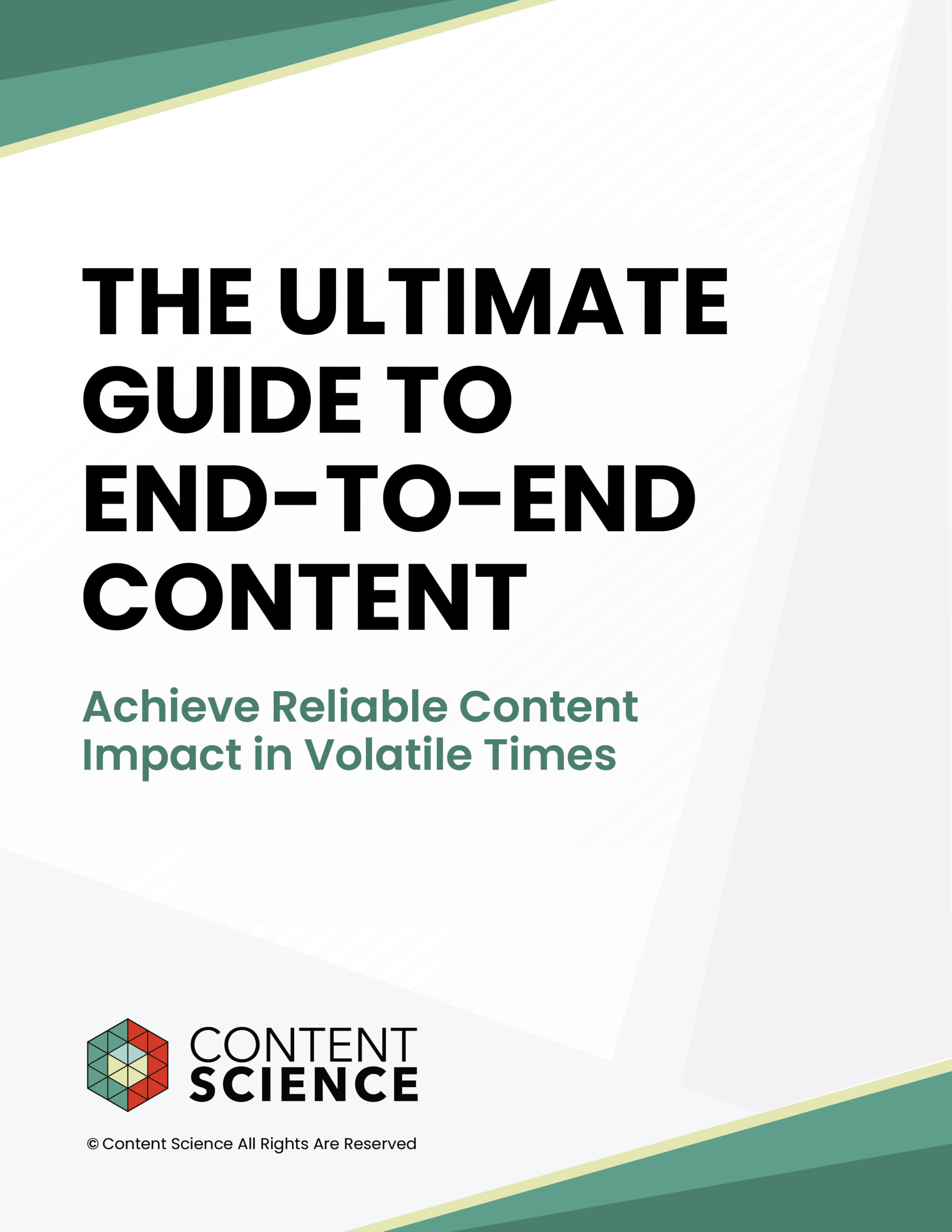
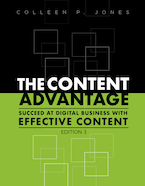
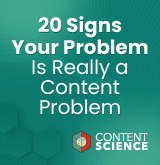
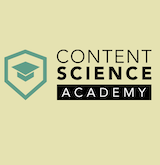
Comments
We invite you to share your perspective in a constructive way. To comment, please sign in or register. Our moderating team will review all comments and may edit them for clarity. Our team also may delete comments that are off-topic or disrespectful. All postings become the property of
Content Science Review.